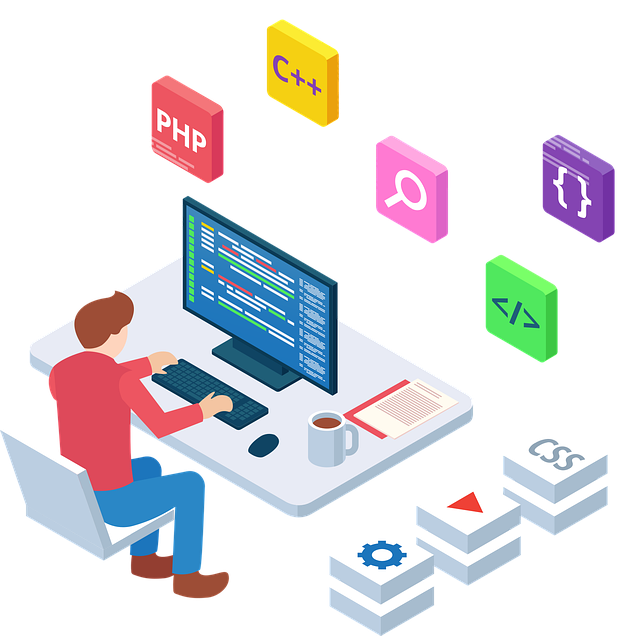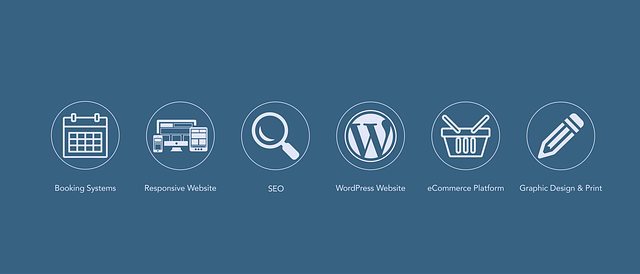WordPress is incredibly popular, running 43% of all websites on the internet. With more businesses understanding the need for a solid online presence, the need for skilled WordPress developers is soaring. These experts are essential in developing and maintaining custom websites that enable businesses to succeed in the online market.
What is a WordPress Developer?
A WordPress developer is someone who knows the WordPress content management system well. They use this knowledge to build and manage websites that meet their clients’ specific needs. These developers have a comprehensive understanding of WordPress and all the tools and plugins that come with it, which allows them to craft customized web solutions.

A WordPress developer is versatile because he or she is a full-stack developer, handling both the front-end and back-end parts of a website. The front end is all about what users see and interact with on the screen, involving the website’s design, layout, and interactivity, crafted using tools like HTML, CSS, and JavaScript. The back end, however, is where the magic happens behind the scenes. It includes server-side tasks, managing databases, and ensuring the website can communicate with other services, often involving programming in PHP and MySQL.
The job of a WordPress developer can be quite varied, touching on many different aspects of website creation and maintenance. Depending on what a particular project or client needs, their duties can include a wide range of tasks.
The roles and responsibilities of a WordPress developer are diverse and can vary depending on the project and client requirements. Some of the key responsibilities include:
· Designing and implementing custom WordPress themes and plugins
· Optimizing website performance and ensuring fast load times
· Implementing security measures to protect websites from vulnerabilities
· Integrating various features and functionalities, such as e-commerce, SEO, and analytics
· Collaborating with clients, designers, and other stakeholders to understand and achieve project goals
· Troubleshooting and fixing technical issues that may arise
· Staying up-to-date with the latest WordPress developments and best practices
During the development process, WordPress developers adhere to best practices and coding standards to write clean, easy-to-maintain, and scalable code. They are natural problem solvers, always looking for solutions to challenges and aiming to achieve outstanding results. With their skill and commitment, WordPress developers are key to helping businesses build a strong and impactful online presence.
To excel as a WordPress developer, one must possess diverse technical and soft skills. At the core, a solid foundation in web development languages is crucial:
· HTML: Used to structure the content and layout of web pages
· CSS: Responsible for the visual styling and presentation of websites
· JavaScript: Enables interactivity and dynamic functionality
Server-side technologies play a crucial role in web development, with PHP and MySQL standing out for their importance. PHP acts as the main engine for WordPress, enabling the platform’s essential features and letting developers craft unique plugins and themes. MySQL serves as a robust database management system, essential for storing and fetching website data effectively.
A deep understanding of the WordPress ecosystem is essential. Developers should be well-versed in:
· WordPress core: The underlying architecture and functionality of the platform
· Themes: Customizable templates that determine the appearance and layout of a website
· Plugins: Modular extensions that add features and functionality to WordPress sites
Knowing your way around popular development tools and version control systems like Git and GitHub is crucial. These platforms help streamline development, foster collaboration, and maintain code quality.
Technical skills aside, a WordPress developer must be a good problem-solver and communicator. They often encounter tricky problems that demand innovative thinking and a knack for breaking down complex issues into simpler pieces. Clear communication is also vital, especially when working with clients, designers, and other team members to achieve project goals.
In the fast-paced world of web development, the ability to keep learning and adapt is key. As a WordPress developer, staying informed about the latest trends, best practices, and security protocols is necessary to provide top-notch solutions.
WordPress Development Tools and Resources
WordPress developers have a treasure trove of tools and resources to make their lives easier and their work more efficient. Tools like Visual Studio Code, PhpStorm, and Sublime Text come packed with features such as syntax highlighting, code completion, and debugging capabilities, making coding a smoother experience and helping to ensure clean and error-free code.
Debugging tools like Query Monitor and Debug Bar are lifesavers, offering a deep dive into database queries, PHP errors, and what’s slowing down the website, helping to pinpoint and fix issues quickly. Browser developer tools like Chrome DevTools and Firefox Developer Tools are indispensable for adjusting and fine-tuning front-end elements directly in the browser.
Plugins and frameworks significantly boost productivity in WordPress development. With tools like Advanced Custom Fields (ACF) and Custom Post Type UI (CPT UI), adding complex functionality becomes a breeze without writing cumbersome code. Frameworks like Genesis and Underscores offer a strong starting point for creating custom themes, promote best practices, and save developers a ton of time.
The WordPress community itself is an invaluable asset. Between the official WordPress Codex, Developer Resources, and vibrant online communities like Stack Overflow and the WordPress forums, there’s no shortage of documentation, advice, and opportunities to connect with other developers.
Choosing a Learning Path
Various learning paths are available for those looking to dive into WordPress development, each offering unique advantages. Self-study is a common choice, tapping into the vast array of online resources. Platforms like WordPress.org, WPBeginner, and Smashing Magazine provide extensive tutorials, documents, and guides on different aspects of WordPress development. These resources, often free, let learners progress at their own pace.
Through online courses or boot camps, structured learning suits those who prefer a more guided experience. Services like Udemy, Coursera, and Treehouse present an array of WordPress development courses catering to all skill levels. These programs usually feature video lessons, quizzes, and practical projects, offering a comprehensive learning journey. Some boot camps also provide mentorship and aid in job placement, appealing to individuals eager to launch their careers.
Another pathway is pursuing formal education in web development or computer science. Though not essential for WordPress development, a degree lays a strong foundation in key programming and software development areas, potentially unlocking a wider spectrum of career prospects and advancement opportunities.
Hands-on practice and project creation are paramount in mastering WordPress development. Aspiring developers should engage in coding exercises, explore various themes and plugins, and undertake personal projects to hone their skills. A portfolio showcasing completed projects cements knowledge and is a significant resource for job hunting or freelancing.
Specializing in a WordPress Development Niche

Specializing in a specific niche, like theme development, can be a smart move for WordPress developers. It sets them apart and draws clients who need expert help creating unique website designs. As a theme developer, you need more than just coding skills. You also need a good sense of design and a deep knowledge of HTML, CSS, and PHP. This way, you can either craft new themes from the ground up or modify existing ones to meet specific requirements, ensuring both beauty and functionality in the websites you create.
Another lucrative niche is plugin development. Plugins extend the functionality of WordPress websites, adding features like:
· Contact forms
· Social media integration
· SEO optimization
· Backup and security
Plugin developers need to be proficient in PHP and JavaScript to create efficient and user-friendly plugins that solve specific problems or enhance the capabilities of WordPress sites.
WordPress customization and optimization can be a rewarding niche for developers who enjoy problem-solving and fine-tuning. This involves:
· Tailoring WordPress sites to meet specific client requirements
· Improving website speed and performance
· Enhancing user experience
· Ensuring cross-browser compatibility
Specializing in this niche requires a deep understanding of WordPress core and knowledge of caching techniques, database optimization, and performance testing tools.
WordPress security and maintenance has become a crucial niche as the importance of website security continues to grow. Developers specializing in this area focus on:
· Implementing security best practices
· Hardening WordPress installations against vulnerabilities
· Conducting regular security audits
· Monitoring for potential threats
· Providing ongoing maintenance and updates
With the rise of online businesses, e-commerce and membership site development has become a highly sought-after niche. WordPress developers who specialize in this area work with plugins like WooCommerce and MemberPress to create:
· Online stores
· Subscription-based websites
· Digital product delivery systems
· Member-only content areas
Expertise in payment gateway integration, inventory management, and user access control is essential for success in this niche.
Building a Strong Portfolio
A solid portfolio is crucial if you’re a WordPress developer aiming to attract clients or land a job. It essentially showcases what you can do, featuring your skills, experience, and personal flair. This helps those considering you for projects or positions to assess your abilities and decide if you match their needs.
Creating a personal website or blog is an excellent method to display your work. It allows you to dictate every aspect of how your portfolio is presented, from the design and functionality to the content itself. This way, you can put your top projects front and center, demonstrating your expertise in the field.
Consider including:
· Detailed case studies
· Screenshots and live demos
· Testimonials from satisfied clients
· Insights into your development process
Contributing to open-source projects and collaborating with other developers is another excellent way to build your portfolio. By actively participating in the WordPress community, you can:
· Gain exposure to a wider audience
· Demonstrate your ability to work in a team
· Learn from experienced developers
· Showcase your contributions to real-world projects
Many WordPress developers use platforms like Upwork, Freelancer, and Codeable to gain experience and build their portfolios. These sites connect you with a global client base, offering opportunities to work on diverse projects and sharpen your skills. Successful completion and positive feedback help enhance your portfolio and reputation, leading to higher-paying opportunities.
When putting together your portfolio, aim for quality rather than quantity. Select projects that best demonstrate your capabilities and the value you add. Make sure to clearly describe your role in each project, including the technologies and methods you used. This clarity helps potential clients or employers understand your contributions and the specific skills you bring to the table.
Soft Skills for WordPress Developers
This involves:
· Active listening
· Asking the right questions
· Providing regular updates
· Explaining technical concepts in layman’s terms
· Handling feedback and criticism constructively
Time management and project planning skills are essential for meeting deadlines and ensuring smooth project execution. WordPress developers should be adept at:
· Breaking down projects into manageable tasks
· Prioritizing and delegating responsibilities
· Estimating time requirements accurately
· Utilizing project management tools like Trello or Asana
· Communicating any delays or roadblocks promptly
Problem-solving and critical thinking abilities are the hallmarks of a skilled WordPress developer. When faced with complex challenges or unexpected issues, developers must be able to:
· Analyze the situation from multiple angles
· Break down the problem into smaller, manageable parts
· Identify potential solutions and weigh their merits
· Think creatively and outside the box
· Make informed decisions based on available information
Web development constantly evolves, requiring adaptability and a keenness to learn new technologies. WordPress developers should adopt a growth mindset, continually refining their skills and keeping up with industry trends. This involves:
· Attending workshops, conferences, and webinars
· Participating in online courses and tutorials
· Experimenting with new tools and frameworks
· Collaborating with and learning from other developers
· Being open to constructive feedback and using it to improve
Strong soft skills can really make WordPress developers stand out in a competitive market. Marrying technical know-how with effective communication, time management, problem-solving, and adaptability allows them to forge enduring relationships with clients, collaborate smoothly with team members, and consistently deliver top-notch results in their projects.
Career Opportunities and Job Outlook for WordPress Developers
WordPress development offers many opportunities for people with different skills, interests, and ways of working. Nowadays, freelancing and remote jobs are popular, giving developers the freedom to work from anywhere. Plenty of platforms like Upwork and Freelancer, along with WordPress-specific job boards, allow developers to find work, showcase their portfolios, and connect with clients who need their skills.
Digital agencies and web development companies offer great opportunities for those who prefer working with others. Companies such as WebDevStudios and Automattic focus on WordPress and provide services ranging from creating themes and plugins to optimizing websites. Working in an agency means being part of a team, learning from others, and getting involved in various projects, including big enterprise solutions. Agencies are great for learning, career advancement, and getting to grips with the latest technologies.
Many companies, including big names like The New York Times and TechCrunch, use WordPress for their websites and have in-house developers to tailor and maintain them. These positions offer stability and the chance to understand and impact one organization’s goals deeply.
The WordPress ecosystem offers many avenues for starting a business, such as selling themes or plugins or offering specialized consulting. Successful businesses in this space, like Gravity Forms and Yoast SEO, have found their niche, delivered value, and built a strong reputation.
The demand for WordPress developers is high and growing, thanks to WordPress’s large share of the content management system market. Freelance WordPress developers can earn between $50-100 an hour, reflecting the strong need for professionals who can create, maintain, and enhance WordPress websites.
Conclusion
Becoming a WordPress developer opens the door to a rewarding career filled with abundant opportunities to earn a significant income, given the platform’s extensive use across the internet. The essence of success in this field lies in the continuous enhancement of skills to meet the evolving demands of WordPress users and stay relevant in the industry.
